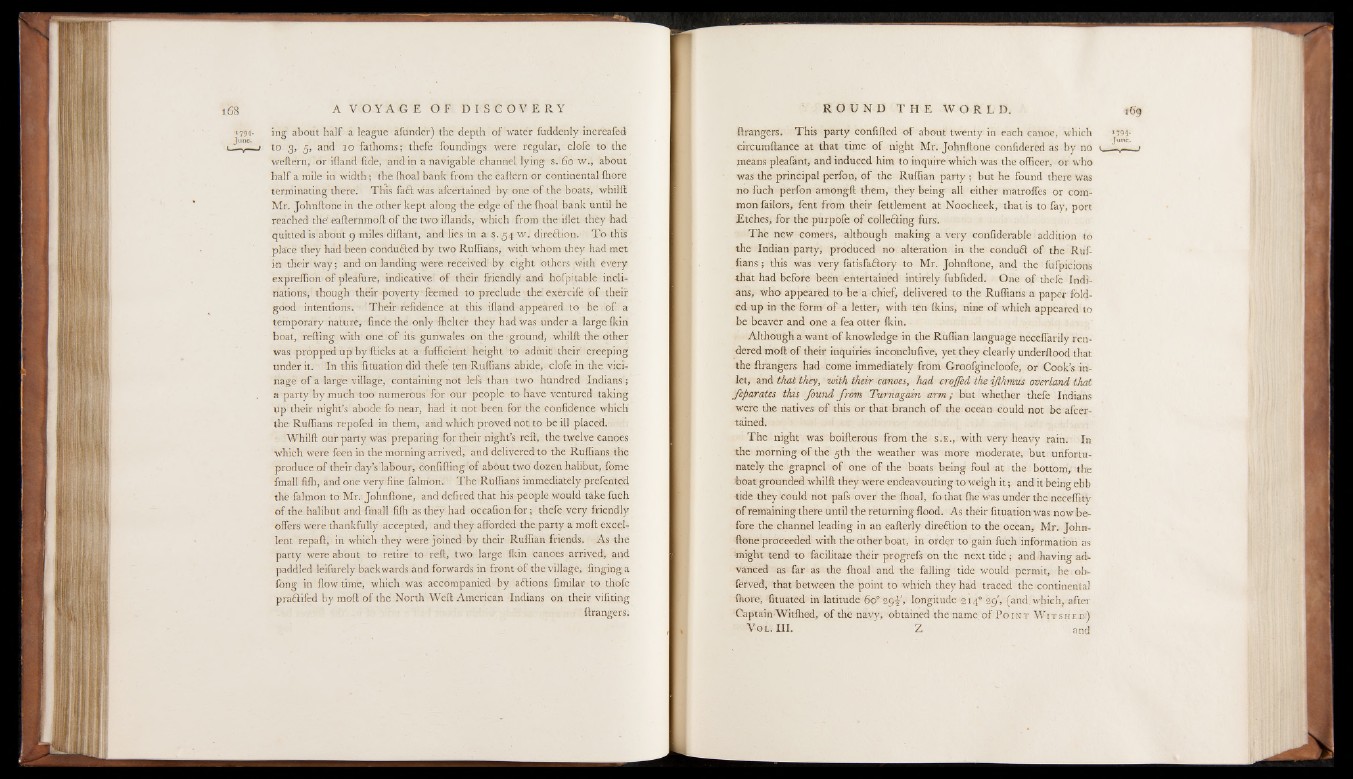
168
■ 1794. ing about half a league afunder) the depth of water fuddenly increafed
to 3, 5, and xo fathoms; thefe foundings were regular, clofe to the
weitern, or ifland fide, and in a navigable channel lying s. 60 w., about
half a mile in width; the flioal bank' from the eaftern or continental Ihore
terminating there. This faft was afcertained by one of the boats, whilft
Mr. Johnftone in the other kept along the edge of the fhoal bank until he
reached the' eafternmoft of the two iflands, which from the iflet they had
quitted is about g miles diftant, and lies in a s. 54 w. dire&ion. To this
place they had been conduced by two Ruffians, with whom they had met
in their way; and on landing were received by eight others with every
expreffion of pleafure, indicative' of their, friendly and hofpitable inclinations,
though their poverty Teemed to preclude the, exercife of their
good intentions. ; Their refidence at this ifland appeared to be o f a
temporary nature, fince the only ffielter they had was under a large (kin
boat, retting with one: of its gunwales ,on the-ground, whilft the other
was propped up by flicks at a fufficient height to admit their creeping
under it. In this fituation did thefe ten Ruffians abide,- clofe in the vicinage
of a large village, containing not lefsl than two hundred Indians';
a party by much-too numerous for our people to have ventured taking
up their night’s abode fo near, had it not been for the confidence which
the Ruffians repofed in them, and which proved not to be ill placed.
Whilft our party was preparing for their night’s reft, the twelve canoes
which were feen in the morning arrived, and delivered to the Ruffians the
produce o f their day’s labour, confiding of about two dozen halibut, fome
fmall fifli, and one very fine falmion. The Ruffians immediately prefented
the falmon to Mr. Johnftone, and defired that his people would take fuch
of the halibut and fmall fiffi as they had occafion for; thefe very friendly
offers were thankfully accepted, and they afforded the party a moft excellent
repaft, in which they were joined by their Ruffian friends. As the
party were about to retire to reft, two large Ikin canoes arrived, and
paddled leifurely backwards and forwards in front of'the village, finging a
fong in flow time, which was accompanied by actions fimilar to thofe
prahtifed by moft of the North Weft American Indians on their vifiting
ftrangers.
ftrangers. This party confifted of about twenty in each canoe, which
circumftance at that time of night Mr. Johnftone confidered as by no
means pleafant, and induced him to inquire which was the officer, or who
was the principal perfon, of the Ruffian party ; but he found there was
no fuch perfon amongft them, they being all either matrofles or common
failors, fent from their fettlement at Noocheek, that is to fay, port
Etches, for the purpofe of coileering furs.
The new comers, although making a very confiderable addition to
the Indian party, produced no alteration in the condufl o f the Ruffians
; this was very fatisfaftory to Mr. Johnftone, and the fufpicions
that had before been entertained intirely fubfided. One of thefe Indians,
who appeared to be a chief, delivered to the Ruffians a paper folded
up in the form of a letter, with ten fkins, nine o f which appeared to
be beaver and one a fea otter fkin.
Although a want of knowledge in the Ruffian language neceflarily rendered
moft of their inquiries inconclufive, yet they clearly underftood that
the ftrangers had come immediately from Groofgincloofe, or Cook’s inlet,
and that they, with their canoes, had crojfed the ijikmus overland that
feparates this found from Turnagain arm; but whether thefe Indians
were the natives o f this or that branch of the ocean could not be afcertained.
The night was boifterous from the s.E., 'with very heavy rain. In
the morning of the gth the weather was more moderate, but unfortunately
the grapnel of one of the boats being foul at the bottom, the
boat grounded whilft they were endeavouring to weigh it; and it being ebb
tide they could not pafs over the ffioal, fo that ffie was under the neceffify
of remaining there until the returning flood. As their fituation was now before
the channel leading in an eafterly direction to the ocean, Mr. Johnftone
proceeded with the other boat, in order to gain fuch information as
might tend to facilitate their progrefs on the next tide; and having advanced
as far as the ffioal and the falling tide would permit, he ob-
ferved, that between the point to which they had traced the-continental
ffiore, fituated in latitude 6o° eg-j, longitude 214° 29', (and. which, after
Captain-Witffied, of the navy, obtained the name of P o i n t W i t s h e d J
'V-ox, III. Z and